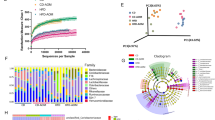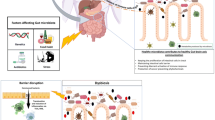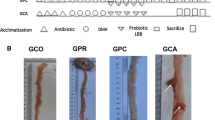Abstract
Objective
Chronic intestinal inflammation is a risk factor for colorectal cancer (CRC) initiation and development. Diets that are rich in Western style fats have been shown to promote CRC. This study was conducted to investigate the role of intestinal microbiome in American ginseng-mediated CRC chemoprevention in a mouse model. The population and diversity of enteric microbiome were evaluated after the ginseng treatment.
Methods
Using an azoxymethane (AOM)/dextran sulfate sodium (DSS)-induced gut inflammation and tumorigenesis mouse model, the effects of oral American ginseng on high fat diet-associated enteric pathology were determined. After establishment of a 16S rRNA illumina library from fecal samples, MiSeq sequencing was carried out to reveal the microbial population. The alpha and beta diversities of microbiome were analyzed.
Results
American ginseng significantly attenuated AOM/DSS-induced colon inflammation and tumorigenesis by reducing the colitis score and colon tumor multiplicity. The MiSeq results showed that the majority of sequences fell into three phyla: Firmicutes, Bacteroidetes and Verrucomicrobia. Further, two significant abundance shifts at the family level, Bacteroidaceae and Porphyromonadaceae, were identified to support ginseng’s anti-colitis and anti-tumor effects. In addition, alpha and beta diversity data demonstrated that ginseng led to a profound recovery from the AOM/DSS-induced dysbiosis in the microbial community.
Conclusion
Our results suggest that the CRC chemopreventive effects of American ginseng are mediated through enteric microbiome population-shift recovery and dysbiosis restoration. Ginseng’s regulation of the microbiome balance contributes to the maintenance of enteric homeostasis.






Similar content being viewed by others
Change history
13 October 2017
This article was originally published with the wrong title.
References
Siegel RL, Miller KD, Fedewa SA, Ahnen DJ, Meester RGS, Barzi A, et al. Colorectal cancer statistics, 2017. CA Cancer J Clin. 2017;67(3):177–93.
Lewis B, Lin J, Wu X, Xie H, Shen B, Lai K, et al. Crohn’s disease-like reaction predicts favorable prognosis in colitis-associated colorectal cancer. Inflamm Bowel Dis. 2013;19(10):2190–8.
Whittemore AS, Wu-Williams AH, Lee M, Zheng S, Gallagher RP, Jiao DA, et al. Diet, physical activity, and colorectal cancer among Chinese in North America and China. J Natl Cancer Inst. 1990;82(11):915–26.
Willett WC. Diet and cancer. Oncologist. 2000;5(5):393–404.
Wang CZ, Anderson S, Yuan CS. Phytochemistry and anticancer potential of notoginseng. Am J Chin Med. 2016;44(1):23–34.
Jiao R, Liu Y, Gao H, Xiao J, So KF. The anti-oxidant and antitumor properties of plant polysaccharides. Am J Chin Med. 2016;44(3):463–88.
Yu C, Wen XD, Zhang Z, Zhang CF, Wu X, He X, et al. American ginseng significantly reduced the progression of high-fat-diet-enhanced colon carcinogenesis in Apc (Min/+) mice. J Ginseng Res. 2015;39(3):230–7.
Wang CZ, Aung HH, Ni M, Wu JA, Tong R, Wicks S, et al. Red American ginseng: ginsenoside constituents and antiproliferative activities of heat-processed Panax quinquefolius roots. Planta Med. 2007;73(7):669–74.
Sekirov I, Russell SL, Antunes LC, Finlay BB. Gut microbiota in health and disease. Physiol Rev. 2010;90(3):859–904.
Sinha R, Ahn J, Sampson JN, Shi J, Yu G, Xiong X, et al. Fecal microbiota, fecal metabolome, and colorectal cancer interrelations. PLoS One. 2016;11(3):e0152126.
Wang CZ, Du GJ, Zhang Z, Wen XD, Calway T, Zhen Z, et al. Ginsenoside compound K, not Rb1, possesses potential chemopreventive activities in human colorectal cancer. Int J Oncol. 2012;40(6):1970–6.
Yu C, Wen XD, Zhang Z, Zhang CF, Wu XH, Martin A, et al. American ginseng attenuates azoxymethane/dextran sodium sulfate-induced colon carcinogenesis in mice. J Ginseng Res. 2015;39(1):14–21.
Ghia JE, Blennerhassett P, Kumar-Ondiveeran H, Verdu EF, Collins SM. The vagus nerve: a tonic inhibitory influence associated with inflammatory bowel disease in a murine model. Gastroenterology. 2006;131(4):1122–30.
Wang Y, Hoenig JD, Malin KJ, Qamar S, Petrof EO, Sun J, et al. 16S rRNA gene-based analysis of fecal microbiota from preterm infants with and without necrotizing enterocolitis. ISME J. 2009;3(8):944–54.
Riehle K, Coarfa C, Jackson A, Ma J, Tandon A, Paithankar S, et al. The Genboree Microbiome Toolset and the analysis of 16S rRNA microbial sequences. BMC Bioinform. 2012;13(Suppl 13):S11.
Attele AS, Wu JA, Yuan CS. Ginseng pharmacology: multiple constituents and multiple actions. Biochem Pharmacol. 1999;58(11):1685–93.
Bing SJ, Ha D, Hwang I, Park E, Ahn G, Song JY, et al. Protective effects on central nervous system by acidic polysaccharide of Panax ginseng in relapse-remitting experimental autoimmune encephalomyelitis-induced SJL/J mice. Am J Chin Med. 2016;44(6):1099–110.
Yun TK. Panax ginseng—a non-organ-specific cancer preventive? Lancet Oncol. 2001;2(1):49–55.
Qi LW, Wang CZ, Yuan CS. Ginsenosides from American ginseng: chemical and pharmacological diversity. Phytochemistry. 2011;72(8):689–99.
Wan JY, Liu P, Wang HY, Qi LW, Wang CZ, Li P, et al. Biotransformation and metabolic profile of American ginseng saponins with human intestinal microflora by liquid chromatography quadrupole time-of-flight mass spectrometry. J Chromatogr A. 2013;1286:83–92.
Wan JY, Wang CZ, Zhang QH, Liu Z, Musch MW, Bissonnette M, et al. Significant difference in active metabolite levels of ginseng in humans consuming Asian or Western diet: the link with enteric microbiota. Biomed Chromatogr. 2017. doi:10.1002/bmc.3851.
De Robertis M, Massi E, Poeta ML, Carotti S, Morini S, Cecchetelli L, et al. The AOM/DSS murine model for the study of colon carcinogenesis: from pathways to diagnosis and therapy studies. J Carcinog. 2011;10:9.
Guda K, Upender MB, Belinsky G, Flynn C, Nakanishi M, Marino JN, et al. Carcinogen-induced colon tumors in mice are chromosomally stable and are characterized by low-level microsatellite instability. Oncogene. 2004;23(21):3813–21.
Dougherty U, Mustafi R, Wang Y, Musch MW, Wang CZ, Konda VJ, et al. American ginseng suppresses Western diet-promoted tumorigenesis in model of inflammation-associated colon cancer: role of EGFR. BMC Complement Altern Med. 2011;11:111.
Jiang T, Gao X, Wu C, Tian F, Lei Q, Bi J, et al. Apple-derived pectin modulates gut microbiota, improves gut barrier function, and attenuates metabolic endotoxemia in rats with diet-induced obesity. Nutrients. 2016;8(3):126.
Johnson JS, Opiyo MN, Thomson M, Gharbi K, Seckl JR, Heger A, et al. 11beta-hydroxysteroid dehydrogenase-1 deficiency alters the gut microbiome response to Western diet. J Endocrinol. 2017;232(2):273–83.
Zackular JP, Baxter NT, Iverson KD, Sadler WD, Petrosino JF, Chen GY, et al. The gut microbiome modulates colon tumorigenesis. MBio. 2013;4(6):e00692–713.
Baxter NT, Ruffin MTt, Rogers MA, Schloss PD. Microbiota-based model improves the sensitivity of fecal immunochemical test for detecting colonic lesions. Genome Med. 2016;8(1):37.
Ahn J, Sinha R, Pei Z, Dominianni C, Wu J, Shi J, et al. Human gut microbiome and risk for colorectal cancer. J Natl Cancer Inst. 2013;105(24):1907–11.
Peters BA, Dominianni C, Shapiro JA, Church TR, Wu J, Miller G, et al. The gut microbiota in conventional and serrated precursors of colorectal cancer. Microbiome. 2016;4(1):69.
Author information
Authors and Affiliations
Corresponding author
Ethics declarations
Conflict of interest
The authors declare no conflict of interest.
Ethical approval
Animals were cared for in the animal facility at the University of Chicago. This facility follows NIH guidelines for the humane care of animals. Use of these animals was approved under the guidelines of the Animal Care and Use Committee and those of the University of Chicago, both of which comply with the guidelines outlined by the National Institutes of Health.
Ethical statement
The manuscript does not contain clinical studies or patient data.
Funding
This work was supported in part by the grants of NIH AT004418, AT005362, GM120046 and 5P30DK042086.
Additional information
A correction to this article is available online at https://doi.org/10.1007/s12094-017-1766-3.
Rights and permissions
About this article
Cite this article
Wang, CZ., Huang, WH., Zhang, CF. et al. Role of intestinal microbiome in American ginseng-mediated colon cancer protection in high fat diet-fed AOM/DSS mice. Clin Transl Oncol 20, 302–312 (2018). https://doi.org/10.1007/s12094-017-1717-z
Received:
Accepted:
Published:
Issue Date:
DOI: https://doi.org/10.1007/s12094-017-1717-z




